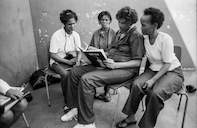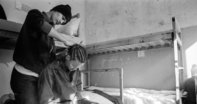A Voice of Their Own
Tracey Derrick, a social photographer, spent a year documenting and interacting with some of the inmates of Malmsbury Women's Prison. She also taught some of the inmates the basics of photography funded by Pick n Pay.

None of the photography students at Malmsbury Women’s Prison had ever held a camera before, two of them could not read or write. They all learnt to hold a camera, click the shutter and wind on to the next frame. They realized they could shoot when the light meter was green and more or less focused. “This feels like a huge achievement physically for them.
Also their concentration span was very short, I kept having smoke and tea breaks for them, then some jumping up and down warming up exercises – especially their fingers.” After a couple of lessons Tracey Derrick gave up on the more technical aspects of the camera and light, market place etc.
“It was empowering for them to sit in a circle with file and pen, look at photo books and learn to work together. This was a new experience in itself for them.” “I do not think that any of the inmates will be professional photographers, but the positiveness that they received and experienced through the course, I hope will help them to be able to choose more about the kind of life they would like to live once they are out of prison.” the course gave them a voice of their own.
‘My Own Journey’ by Tracey Derrick

“I was the outsider who got caught in the middle. As a photographer I ignored the photographs – they were out of focus and dark – you could not see the image clearly and they had strict instructions to photograph their daily life and rituals in prison.” - Tracey Derrick The inmates exhibition photographs speak to the outside world and reinforce to us that they are here.
Tracey Derrick learnt a great deal through this project. To work in an institution such as a prison, and experience the order of control that it is, “It was sometimes quite shocking, yet at other times the rigidity of the system made sense.” Sometimes the fact that she was there teaching photography was secondary, “it was more important that I was just there.” Someone from the outside world, who cared, who gave them a different space to be, just to be.
“I listened, we talked, I posted letters for them, brought them tobacco and phone cards, made calls myself for them from my home phone. I alleviated a lot of their boredom, Thursdays were important days for them. It was important for me to let the theory go and learn to move with their moods.”